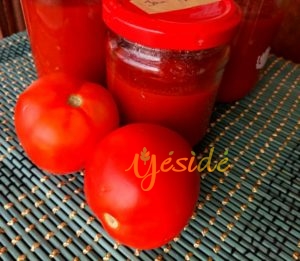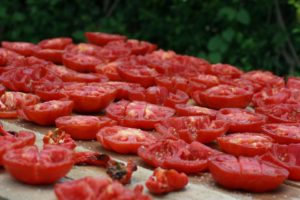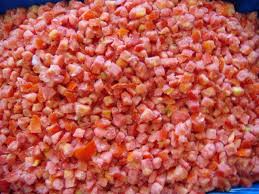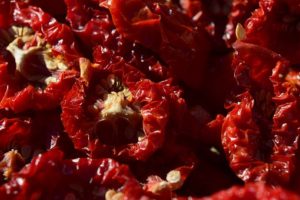
Preserving Tomatoes and peppers especially in Nigeria and the rest of Africa is important. These fruits are widely produced and eaten, yet having them fresh all year round at affordable prices is a tremendous challenge. Food preservation and processing is one area that we have not gotten right in our agriculture (West Africa) and it is essential for food security especially in a growing population like ours.
Tomatoes, pimento peppers (Tatase) and Chilli pepper (Shombo) and scotch bonnet (Rodo) are currently cheap in the Nigerian market. The trend is that baskets and baskets of these products spoil before leaving the farm or by the time it reaches the market, they have deteriorated and therefore waste. In a few months, they will become scarce again and prices would skyrocket; this is the usual pattern.
The story is a bit different for a country like Ghana, where production of tomato is low leading to a high unit cost of tomato production.

In Nigeria, fruits of the efforts by the government at mopping up excess tomatoes and pimento peppers as well as establishing practices that reduce the time of deterioration (during the time it takes to reach consumers from the farm) are not yet being realized by the public.
So, what can Nigerian citizens do at home to preserve tomatoes and pepper during the surplus season?
There are a number of options. They include:
- Bottling/canning
This is a traditional method of food preservation. One thing that you can do is to bottle up/Can this produce and keep them until that time when market prices so nutty.

While it can be hard to make huge batches of the tomato or pimento pepper mix since we eat a lot of stews made from them, what you preserve can be used to replace your tomato paste or tomato-pepper concentrate.
This can be sort of like your tinned tomatoes or tomato concentrate, only home-made, no BPA, no corn starch, no colouring and artificial preservatives.
You can get information on how to can/bottle your tomatoes and peppers from the internet. Look out for sites with credible information.
While Canning is a great way to preserve your tomatoes and peppers at home, the challenge lies in your ability to ensure safety. If not done properly, home canning of tomatoes can be deadly. It can result in Botulism, caused by a microorganism, clostridium botulium and can lead kill.
If you cannot ensure that you do this the canning or bottling correctly, I suggest that you do not try this method.
- Freezing
Freezing is also a great way to preserve tomatoes and peppers. You can blanch, cool and freeze your tomatoes whole or chopped. You can also make a concentrate out of your tomatoes and peppers and freeze. This would reduce the amount of space that whole tomatoes take up in your freezer.

This method is great if you can get a ‘steady’ supply of electricity. In Nigeria, this can be dicey but if you have a generator that can also supplement the power from the national grid, and have a good working freezer, then you are good to go.
- Drying and dehydration
This is a great way to preserve tomatoes and peppers. For tomatoes, the varieties that have thicker pulps are better. You can dry your tomatoes and peppers in many ways: sun drying, oven drying, and microwave drying.
If you get access to a dehydrator, you can also dehydrate them, and store in air tight containers.

Are there safety issues with drying? Certainly. When tomatoes or peppers are not properly dried, it gives room for microbial growth which can be dangerous to the health.
Bottom line:
Home preservation of tomatoes and peppers might be a good way to mop up some of the surplus tomatoes and peppers in the market. It also helps you to save some money and reduce the stress of getting cheap tomatoes when the season is lean.
Are preserved tomatoes and peppers nutritious? Yes, some nutrients are loss during the processing especially the water soluble vitamins but you still have some nutrients and phytochemicals like lycopene (cancer-fighting compound) smiling at you. You also do not have BPA that lines the inside of tinned Tomatoes and is dangerous to health. You do not have any artificial colouring or any ingredient that you do not want in your food.
Is it cheaper than getting tinned tomatoes or packaged tomato paste? Depending on what quality or brand you go for, you can get really affordable tinned Tomatoes. However, if you want something different, homemade, and healthy too, you can try this out.
Finally, go and stock up on tomatoes and peppers, process and preserve them well and store them for the time when it gets expensive again.
Our goal is to inspire you to eat better and liver better.



Hmm..thanks for sharing.
This helpful, thanks